On 30 November, Property Week and Newcore Capital hosted a Social Impact Spotlight event at Dentons’ London office titled ‘How to do the S in ESG’, where experts discussed the best ways for businesses in the property sector to embed positive social impact into their projects.
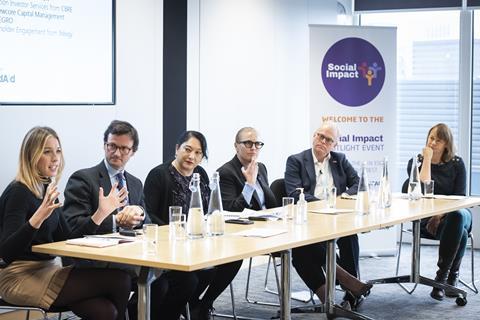
Panel of experts
Kaela Fenn-Smith, head of advisory & transaction investor services – CBRE
Andy Gulliford, chief operating officer – SEGRO
Liz Hamson, editor, Property Week
Hugo Llewelyn, chief executive officer – Newcore
May Molteno, head of sustainability and stakeholder engagement – Trilogy
Kate Sandle, UK director of programmes and engagement – B Lab
Speakers
Deepa Deb, head of UK real estate – Dentons
Paul Morrish, chief executive – LandAid
Ed Tytherleigh, director of support and housing – Centrepoint
Reverend Richard Coles
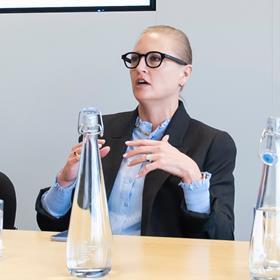
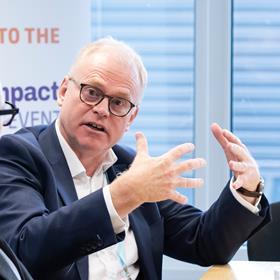
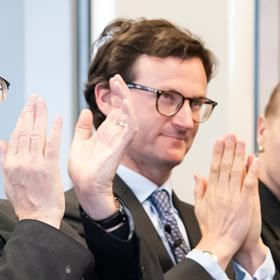
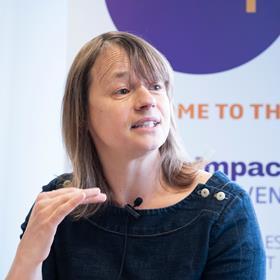
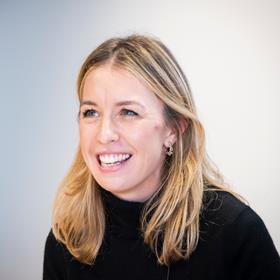
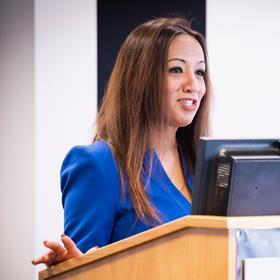
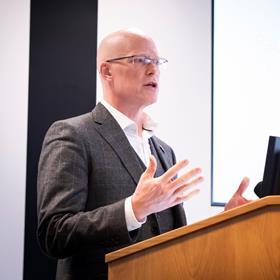
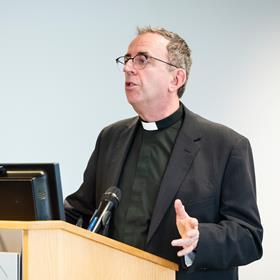
Welcoming attendees to the event, Dentons’ head of UK Real Estate Deepa Deb noted that while great progress had been made by the industry since she started working in the City at a time where there was almost no diversity, a bit of work still needs to be done to address the social impact question and create more of an equal playing field.
Next up was LandAid chief executive Paul Morrish, who said that although the industry talked about social impact efforts and was increasingly doing more in the ESG arena, there was still a lack of focus in its efforts. He pointed to research that found 14 big construction companies had delivered around £15m of value but noted that the amount was spread so thinly around 8,000 charities that it lost the ability to have significant impact.
He stressed the importance of focus, likening it to the difference between the mist setting on a hose pipe in the garden to the jet setting. “If we want to do something really significant to change society for the better, we need to rethink the way that we’re working,” he added.
He also noted the importance of mixing that focus with ambition and boldness to look at and tackle some of the long-term challenges faced by society – such as poverty and youth homelessness – adding that this is can be achieved by the industry working in partnership.
“What we need is to reconceive that ownership of social impact, weaving beyond simply the work that any one company does to what we can all achieve together.”
Delivering the keynote speech was musician, radio presenter, journalist and Church of England parish priest Reverend Richard Coles, who stressed the importance of accessibility of resources, including housing and education to the young, poor and hungry, taking the audience back to his time as a young, gay man moving from Kettering to London, through his journey to his first parish in Lincolnshire and then to Peterborough.
He noted “It’s not all about money, your balance sheet, profit and loss and quarterly returns. It’s also about goodwill – and goodwill changes the world. It makes a massive difference in the lives of people and everybody wins.”
On the topic of making positive change in the lives of people, Coles spoke about his time as a vicar in Peterborough, where he was able to use his reach to create positive social outcomes around housing and education.
Finding that poorer primary school kids in social housing were not very engaged in literacy and learning, he sold some land owned by the church and used the funds to build a nursery school to ensure the children had “that opportunity to level up in terms of their engagement with learning and literacy” before they got into school.
When he found that opportunities on the other end of the education system were also unequal, he got involved with the University of Northampton, where he is now chancellor, and succeeded in building a £350m campus in the centre of the struggling county town.
He also talked about how as a board member of his local housing association, to combat poor housing, he worked in collaboration with people in the property industry and the financial sector to build more housing for people on low incomes including 50 houses in his own parish.
Next, Liz Hamson chaired a panel discussion with industry experts including B Lab UK’s director of programmes and engagement Kate Sandle, CBRE’s head of advisory and transaction investor services Kaela Fenn-Smith, Newcore’s chief executive officer Hugo Llewelyn, SEGRO’s chief operating officer Andy Gulliford and Trilogy’s head of sustainability and stakeholder engagement May Molteno.
Liz Hamson: What does the S in ESG mean to you and your business?
Hugo Llewelyn: The S is probably the most important part of ESG. As a business, it’s creating the right culture for your team and your clients, but also using your skills in a non-profit way.
We’ve found that we give a decent amount of our time, skills and our own money, we can make a really positive impact to try to heal that schism in society that is so obvious. As part of this, Newcore supports its employees, giving up to 10% of their time pro-bono.
Kaela Fenn-Smith: The divide in this country about the fate of someone because of where they were born, what family they were born into and the circumstances they struggle with is very visible. Part of the reason I joined CBRE was it had the ability in terms of scale to make an impact. Our business is globally very invested in making social change through employment, people and diversity.
Andy Gulliford: It’s about the width and breadth of opportunity, be that economic, educational or lifestyle. To really have an impact, what we’ve done is put together a programme called Responsible SEGRO, where we’ve looked at community investment plans and funded work with local communities.
May Molteno: Getting diagnosed with breast cancer was a really key moment in my life because I had to face the thought of dying. When we properly look at dying, we have to think about what makes living worthwhile. It becomes a question of what difference have we made. And how we answer that question, whatever sector we’re in is really interesting. So for me, the S is about that. I’m interested in how we have a wider understanding of wealth and how we build social capital and social value.
Kate Sandle: Diversity is key. We talk about representation but what does it really mean to be inclusive? Policies and practices are essential to set the boundaries but it isn’t only about them!
LH: What about the wider supply chain? None of this really matters if you haven’t engaged with that.
KS: It’s really key to understand who is in your supply chain, where they’re from and what they’re purpose is. Look at the representation in your supply chain, is it relevant to the community you’re working in? And then you have to look at the impact you’re having further on whether from an environmental perspective or a social perspective.
LH: Visibility of the supply chain is perhaps the starting point. So Andrew, what do you do with the other elements of the supply chain?
AG: We make sure that our construction contractors are paid a living wage. We make sure that a proportion of jobs on our construction sites are for local people and that our supply chain in all respects are basically SMEs in the local area and that we engage with them.
LH: What needs to be done to engage the wider supply chain?
KF-S: As a business, we’ve committed to spending $1bn this year on diverse suppliers – businesses at least 51% owned and operated by underrepresented individuals or groups – and that goal will increase to $3bn over five years. We’ve also signed up to Buy Social Corporate Challenge, working with 26 other corporates to collectively spend £1bn with social enterprise suppliers. These are social elements of our diversity plans and we’re really trying to embed those globally.
LH: May, talk us through some of the obstacles to embedding the ‘S’.
MM: It’s about will. If you want to make change, you can make change. It starts with talking to people you don’t normally work with. Make the effort to listen to other people who face different challenges. That gives you more information as well as creative solutions. The brilliant thing about working in property is that we control resources and communities need resources to thrive. So you can make choices about those resources that really ignite community value and strength.
LH: Kate, tell us about B Corp.
KS: B Corp recognises that there are many global challenges – racial injustice, social inequality, climate emergency – thahave been perpetuated, if not caused, by business. Business is the most powerful man-made force on the planet. So, how can we harness the power of business to create change and try to solve some of these challenges?
If we recognise that people and planet are just as important when it comes to profit, then we could create the most amazing world to live in. One way B Corp is trying to do this is changing legislation around the world to enable businesses to make a profit whilst having a positive impact on people and planet. We’re also creating a community of businesses through our certification who have reached a high standard of environmental and social performance.
There are now over 4,000 businesses certified B Corp across the world, including around 500 in the UK. Our tool, which is being used by 150,000 users across the globe, is used to measure and understand the impact of businesses.
LH: Where will we be in two or three years’ time in terms of B Corp status? And how big a role is pro bono going to play in the industry’s social impact?
HL: Hopefully, it will play a bigger role. The LandAid pro bono programme is the conduit between companies that want to do pro bono work and charities that want property investment or asset management advice. We have about 90 to 100 corporates involved so far and we are trying to increase that number. Everyone is on a mission to get their ‘S’ going and this is a great way to do it.
KF-S: We all have to move our businesses forward environmentally and socially and to bring everybody with us. Engaging with local communities is vital. We’ve also developed a tool that gives a picture of what the social needs are in communities, helping to measure what your input is and growth against where it started and where it has improved over time.
AG: I am really optimistic about where we will be in three years’ time. There is definitely some push in terms of regulation and requirements and more people are looking to do the right thing, so I’m really optimistic.
MM: In two years’ time, I’d love for the industry to fully grasp the climate emergency and understand the scale of change that’s needed. We also need to look at how we can build places people want to be in and build social capital.
LandAid are the property sectors charity. They are working with the industry to end youth homelessness.































No comments yet